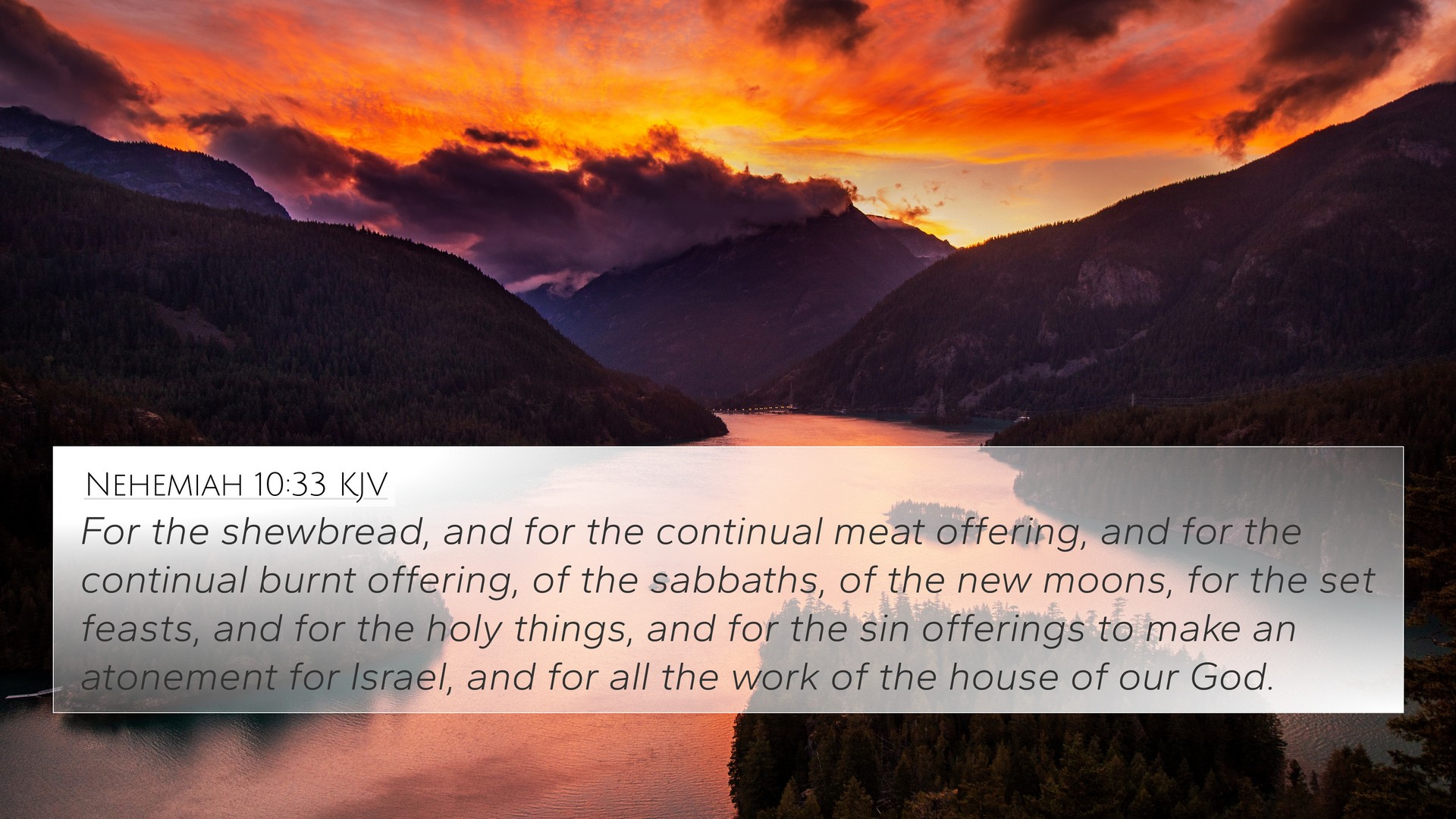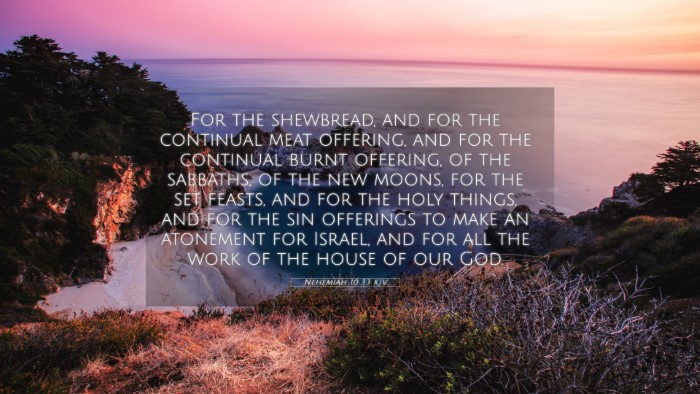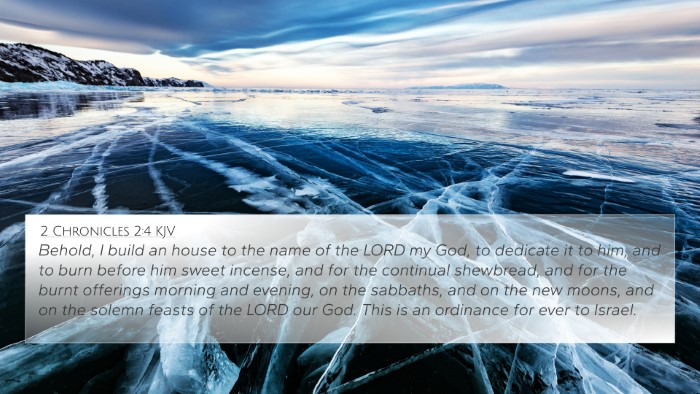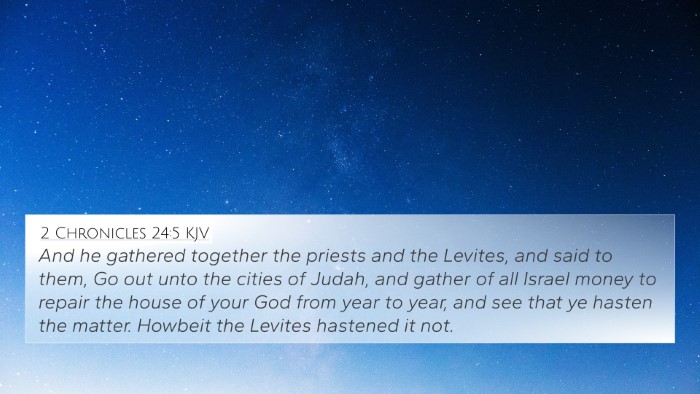Understanding Nehemiah 10:33
Nehemiah 10:33 states, "For the showbread, and for the continual meat offering, and for the continual burnt offering, of the Sabbaths, of the new moons, for the set feasts, and for the holy things, and for the sin offerings to make an atonement for Israel, and for all the work of the house of our God."
Summary of the Verse
This verse is a part of a covenant made by the people of Israel to uphold their religious duties and ordinances. It emphasizes the importance of offerings and sacrifices in their worship and dedication to God, focusing on how these practices are vital for maintaining their spiritual relationship with the Lord.
Commentary Insights
-
Matthew Henry:
Henry emphasizes the collective responsibility of the people in fulfilling their spiritual duties. He notes that the verse reflects a comprehensive approach to worship that includes various offerings and sacrifices, highlighting their necessity for atonement and proper worship in the temple.
-
Albert Barnes:
Barnes outlines the significance of each type of offering mentioned. He underscores that these offerings are meant to appease God's anger and signify a commitment to His service. The mention of the "sin offerings" indicates an awareness of the need for sacrifice due to human shortcomings.
-
Adam Clarke:
Clarke discusses how this verse denotes the Israelites' return to covenant faithfulness. He highlights that the requirements of the offerings are rooted in the Law of Moses, indicating a desire to align their practices with divine expectations as they rebuild their community post-exile.
Connections to Other Bible Verses
Nehemiah 10:33 illustrates significant themes found throughout the Bible, especially regarding sacrifice, atonement, and worship. Here are some important cross-references:
- Exodus 25:30: References the showbread and God's commands regarding its presentation.
- Leviticus 24:5-9: Discusses the preparation and significance of the showbread as an eternal covenant.
- Hebrews 9:22: Indicates that without the shedding of blood, there is no remission of sins, reflecting the importance of atonement in worship.
- Malachi 1:11: Speaks about the proper worship of God and the prevention of unworthy offerings.
- 1 Chronicles 16:40: Describes the duties associated with the tabernacle and offerings as commanded by God.
- Romans 12:1: Paul encourages believers to present their bodies as living sacrifices, connecting New Testament beliefs to Old Testament practices.
- Matthew 5:23-24: Jesus highlights the importance of offering in a right spirit, illustrating continued relevance of sacrifices in maintaining a relationship with God.
- 1 John 1:9: Reiterates the need for confession and God’s faithful forgiveness, tying back to the concept of sin offerings.
- Leviticus 23:37: Discusses the observance of feasts, paralleling the themes found in Nehemiah’s commitment to sacred times.
- Colossians 2:17: Speaks to how these feasts and offerings pointed towards Christ, indicating that they were a shadow of what was to come.
Thematic Analysis
Nehemiah 10:33 forms part of a larger narrative about restoration and covenant renewal. The offerings signify not just duty but a relationship with God, showcasing major themes such as:
- Atonement: The need for reconciliation with God through prescribed offerings.
- Covenant Faithfulness: The commitment of the people to uphold the terms of God's covenant.
- Worship Practices: The necessity of maintaining the sanctity and order of worship through ritual.
Using Cross-Reference Tools
For anyone wishing to study Nehemiah 10:33 in greater depth, utilizing tools for Bible cross-referencing can enhance understanding. Here are some tips:
- Employ a Bible concordance to find related terms and themes.
- Use a cross-reference Bible study guide to link verses by themes or keywords.
- Engage with a Bible reference resource to draw connections between Old and New Testament concepts.
- Consider employing a Bible chain reference system for discovering interconnected scriptures.
Conclusion
Nehemiah 10:33 encompasses essential elements of worship, atonement, and community commitment to God’s laws. By cross-referencing with similar verses, one can appreciate deeper meanings within the scriptures, aligning personal and community faith practices with biblical teachings.







